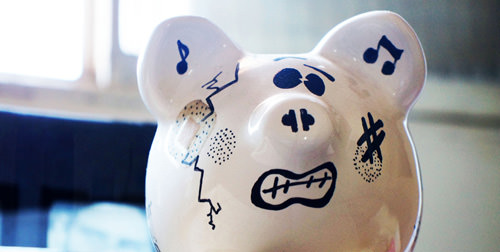How to Overcome Your Fears and Start a Business
Fri, 1 Jul 2016, in Business
There was a time when I had an idea but really didn’t know where to start.

Then came something that could be attributed to a spark – a moment at which doubt eliminated and a decision was made to start working towards a goal. I’m talking about the time I set my sights on developing new service desk software back in 2011.
Back then I stumbled upon a show called Shark Tank, where entrepreneurs pitch their ideas and startups to investors in hopes of receiving some money in exchange for a stake in their up-and-coming businesses. These investors are either multi-millionaires or billionaires who honed their skills with mergers, acquisitions and similar high-stakes deals.
One of these investors and a star of the show, Kevin O’Leary, made the biggest impact on me. Kevin is a Canadian businessman that has a knack for preying on business owners’ fears.

That’s because his personality trait (at least on the show) is that of an egocentric startup-basher. If he’s not rejecting businesses outright, he criticizes their every detail. While other investors would rather back out from doing a deal, Kevin prefers to make ridiculously lowball offers instead.
He also likes to tack on (sometimes unreasonable) conditions, royalties and fees instead of straightforward equity deals other sharks prefer. As a result Kevin doesn’t get many deals. In fact, he gets constantly rejected by entrepreneurs who can see right through his antics.
Fear of rejection
If you watch the show long enough, it doesn’t even look like he wants to make a deal with anyone. Although it seems like a counter-productive strategy at first, it gives him the upper hand in any negotiation. He can structure deals that benefit only him, every time.
How does he do it?
After his initial offer gets rejected, he doesn’t pause, reflect on his actions or feel sorry for himself. Instead, he asks “Why?” – he wants to know whether to improve his offer or at least hear some justification why the founders think their company deserves more.

By behaving this way, Kevin shows everyone what kind of person he really is – a ruthless capitalist out to make a buck, that’s true. But he’s also someone who’s not afraid to ask for something that has realistically a very small chance of working out.
And that’s why I like his fearless style so much.
How I dealt with it:
Did you ever wonder how someone “got hooked up with that job”, “landed that great deal” or otherwise turned a pressing constraint into opportunity? It’s usually a matter of asking, getting a “no”, getting up and asking again.
No one said growing a business and finding customers is easy. Constant rejection is very negative and can wear you down quick. But if you’re getting the cold shoulder and have an opportunity to ask “why” – do it.
By collecting and managing ideas submitted by our customers, you’ll begin to understand why others see you the way they do.
Fear of failure
Without risk there is no reward, and starting a business is in many ways like entering a battlefield. Without any weapons. Through no fault of their own, failed businesses have damaged many lives – sometimes leading to emotional breakdowns, divorce or bankruptcy.
Kevin is fiercely critical of entrepreneurs that take a second mortgage or borrow a large amount of money from their families to invest into a “stupid idea”. And rightly so. He claims business is all about making “calculated”, not “senseless” risks.
Although the world is full of bad ideas, just as many can prove profitable – to the point that it’s difficult to tell which is which. Knowing when to pull the plug and minimize financial disaster is just as important. So the sooner you bail on a failing idea, the sooner you can start working on another idea that shows more promise.
How I dealt with it:
Just like there are many ways to succeed, there are many ways to fail, too. We divided our “fails” into two categories early on which greatly helped us with crisis management:
- failure in execution of product within known market
- failing to find an answer among many unknown variables
For example failure in execution within a known market constitutes an inability of performing a specific set of tasks using specific resources. An example of this would be work performed by your team members. If they can’t perform in a given role, we tend to either find them another role that matches their strengths or fire them.
When you fail in reaching a more abstract goal, like reaching a funding goal in a specific time frame, you shouldn’t hold yourself up to the same high standard.
While failure will hurt and set you back time and time again, it’s also a natural part of running a business.
Fear of losing clients
Congratulations! Your product is useful enough for strangers to pay you money for it! True, once we gained about 1000 customers – we thought the worst was behind us.
Not quite.
Then surfaced the questions of reaching out to them, figuring out what works and what doesn’t. The dreadful feeling of investing development time into a feature that may not be exactly what our users want. What if we get a service outage? What if we innovate in the wrong area? What if our competitors come out with a better product?
Then all these customers would leave as quickly as they signed up.
How I dealt with it:
When we’re faced with an important decision, we ask ourselves (better yet, our customers) the following question: “Will this help the customer”? If it’s a “no” or even a “maybe”, we don’t go through with it.
As mentioned before, customer feedback is at the center of everything we do, so we avoid adding features that they may not find useful. At the same time, not all customers are created equal and there are times when you need to get rid of them.
One of Kevin’s famous quotes that I still go by is,
When you know it’s just not going to work out, rip the Band-Aid off, fast.When you’re running a business, your responsibility sits with the success of the whole organization, not with yourself, an employee – or even your customer.
Fear of self
Sometimes you can be your worst enemy. We tend to pay attention to things that reinforce our beliefs and feed into our self-limiting attitudes. This distracts you from the all-important path of focusing on what’s important to you.

There are many things that put doubt in our minds:
- wondering if we should listen to others and take their advice
- making a bad decision or backtracking on previous decisions
- keeping or getting rid of unproductive employees / clients
Self-esteem issues, anxiety and taking wrongful advice to heart can feed into your defeatist altitudes. Self-limiting beliefs such as these won’t just throw your business plans off track. They can eat at you, amplifying your fears to the point of forcing you to accept decisions that go contrary your success and well-being.
So the degree to which you allow self-doubt free reign in your decision-making process can give you clues to what is the driving force behind your fears.
How I dealt with it:
By keeping self-defeating thoughts in check, we’re able to do think ahead more clearly. It means improving communication between our team, holding regular meetings and ensuring everyone’s voice is heard regarding any decision.
Everyone’s business and situation is different, so chances are the fears that are holding you back from achieving success are, too.
The first step to overcoming your fear is being honest with yourself about it and addressing the root cause of its manifestation. Sometimes however, fear is part of your rational sense kicking in to warn you of impeding danger – something that you shouldn’t ignore either.
By understanding and taking control of your fears, you’ll be able to avoid doing the things that will hurt you, while being aware of necessary, calculated risks that need to be taken in order to grow a successful business.
Tags: business



